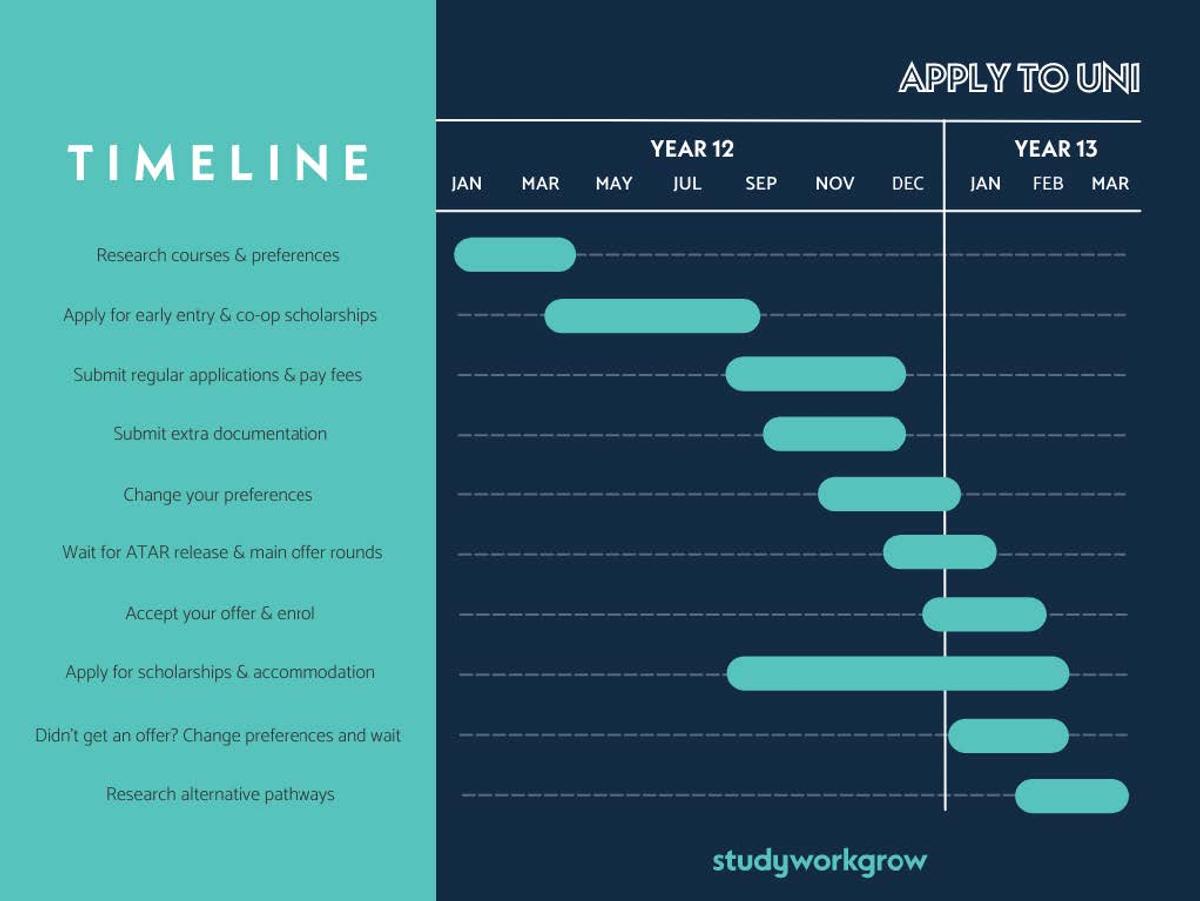VET, CAREERS & PATHWAYS
News from Helen Leicht

VET, CAREERS & PATHWAYS
News from Helen Leicht
We congratulate five of our Year 12 students who have each had the good fortune to received an early offer from James Cook University.
| Matthew | Filippone | Bachelor of Occupational Therapy (Honours) |
| Tom | Barber | Bachelor of Engineering (Honours) |
| Harry | Hume | Bachelor of Engineering (Honours) |
| Kael | Newcombe | Bachelor of Education (Secondary) |
| Joshua | Gaza | Bachelor of Engineering (Honours) |


University applications are now open in all states and territories of Australia – and if you’re in Year 12 and thinking of applying for 2024, we’re here to help!
In this blog we’ll go over some of the basics you need to know about applying to university, plus list some key dates.
First, take a look at this handy timeline to get an overview of the university application process.


How do I apply?
If you’re in Year 12, you’ll most likely need to apply through a Tertiary Admissions Centre (TAC). The benefit of TACs is that you submit just one application for multiple universities and courses, saving you time and effort.
Here’s a link to the TAC for each state and territory:
What about Tasmania? Well, seeing as the University of Tasmania is the only uni in Tassie, they take applications directly.
Which TAC do I apply to?
Simple – apply to the TAC that’s in the same state or territory as the university you want to attend.
So, if you’re thinking of heading to UNSW in Sydney – even if you live in Melbourne, Alice Springs, or Broome – you’ll need to apply through UAC.
When can I apply?
Now! UAC and TISC both started taking applications in early April this year, while the rest of the TACs opened applications in August.
For UTAS, you can apply through their School’s Recommendation Program for early entry until 6 October. Regular course applications are also open now (check individual course pages for closing dates) and you can apply right up until courses start in 2024 – but be aware that courses with limited numbers will close earlier, around 30 September. You don’t need to have your ATAR or results to apply – your TAC will automatically receive this information once it’s released in December.
How do I apply?
Each TAC has its own instructions for applying. For more detailed information, take a look at their website, or check out our Apply to Uni Guide.
When do applications close?
TACs have several application and offer rounds throughout the year – this means that if you apply by a certain date, you’ll receive an offer by a certain date. Even though applications are usually open until late January/early February 2024, it’s wise to apply for your course ASAP, as some have limited places and you won’t want to miss out. The following table has the main offer round application closing dates for Year 12 students (which is usually the first round after ATARs have been released), as well as the final dates to apply for courses in 2024:


*You can change your preferences at any time up until the offer deadline, but it’s advised that you do so ASAP. With QTAC, you can change your preferences as many times as you like, but after the first three times you’ll have to pay a fee.
**Change of preferences for all Semester 1 courses close on 3 January 2023, regardless of offer round.
***You can change your preferences with UTAS at any time up until you receive an offer. Contact UTAS directly to find out more.
When can I expect to receive an offer?
As we said above, offers are generally rolled out on an ongoing basis depending on when you applied. Check the key dates section on your TAC’s website to see specific offer round dates. Based on the above application dates, here’s when you’ll most likely hear back:


Yay, I got an offer – but what’s next?
Congratulations! If you’ve received an offer (and you’re happy with it), the next step is to accept the offer.
This is an important step – if you fail to respond to the offer, it will lapse and you’ll need to wait for the next offer round.
Here are the dates you need to accept your offer by:


*You will receive an offer email directly from the institution detailing the date you’ll need to accept your offer by, and further instructions.
**For most courses, SATAC accepts the offer on your behalf. If you wish to change your offer response you can do so on the Offer Status page of your SATAC application.
***When UTAS contacts you with an offer, they will walk you through what happens next.
I got an offer…but not for the course I wanted. Now what?
You will have noticed during your application that you could list several course preferences In some cases, you may not receive an offer for your first preference, but receive one for your second and so on.
If you’re really insistent on getting an offer for your dream course, you can simply let the offer you’ve received lapse and wait for the next offer round to see if you receive an offer the next time around. But this can be risky, as there’s no guarantee you’ll receive any offers next time, even if you received one in the last round.
What we recommend is that you conditionally accept or ‘bank’ your offer. This means you can wait for the next offer round, and if you still don’t get an offer for the course you really want, you can then go back and accept the first offer you received.
See your TAC’s website for more information on offers.
Always remember to let the uni know before the deadline if you don’t want to accept the offer, or you could end up being enrolled in the course and have to pay some or all of the fees.
What do I do if I don’t receive any offers?
If you don’t receive an offer for any of your preferences in one round, you can simply wait for the next offer round and see if you get an offer next time. You might like to re-order our preferences or add new courses to your application to boost your chances of receiving an offer.
At this point, we recommend you start looking into alternative pathway options, just in case you don’t receive any offers by the final offer round.
Where can I find out more?
If you want more information on applying to university, check out the TAC websites, or contact them directly – they’re happy to answer any questions you might have.
Or you can get a copy of our Apply to Uni Guide, packed with tons of info on the application process in each state and territory.
Academic Ranking of World Universities for 2023
Shanghai Ranking has just released the Academic Ranking of World Universities (ARWU) for 2023, listing the top 1000 universities across the globe.
The ARWU is a widely-recognised ranking system that evaluates universities worldwide based on their academic excellence and research prowess. Established in 2003 by Shanghai Jiao Tong University, the ranking aims to provide students, researchers, and institutions with a snapshot of how universities compare globally in terms of their academic achievements.
Why use the ARWU?
If you’re searching for a place to study, there are a few reasons why searching the ARWU can be beneficial.
The ARWU ranks universities based on objective criteria such as the number of Nobel Prizes and Fields Medals awarded to faculty and alumni, research publications, and citations. This can give you a sense of a university’s success free from any subjective bias.
Higher-ranked universities often enjoy a strong international reputation, so if you’re considering studying or conducting research abroad, a university’s ARWU ranking can give you an idea of how it stands on the global stage.
Universities with higher ARWU rankings also tend to have more research funding and collaborations, offering you greater opportunities to engage in cutting-edge research projects.
Keep in mind
While the ARWU can be a helpful resource, it’s important to remember that the rankings are just one part of the equation.
The ARWU rankings are heavily weighted towards those interested in research and academia – they don’t account for every aspect of university life. Consider your interests, location preferences, available programs, career opportunities, and extracurricular opportunities alongside the rankings.
Rankings can be competitive and change from year to year. Don’t solely rely on them; explore other resources like university websites, program details, and student reviews to get a well-rounded perspective.
It’s also important to remember that universities’ strengths can vary by region. A lower- ranked university in the global ranking might excel in a particular country or continent.
Top 10 global universities for 2023
Here are the top 10 global universities in the ARWU for 2023:
Top 10 Australian universities for 2023
And here are the top 10 Australian universities in the ARWU for 2023:
You can see the full list here.